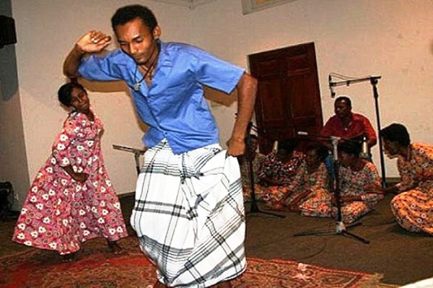|
Musings:
The dark continent - so far, so near
by Padma Edirisinghe
It was in a pathetic posture that this writer, a pig tailed
schoolgirl then, first saw that large continent which hung on a
blackboard in a classroom by the sea. Yet, there were mitigating factors
such as relief provided by patches of brilliant colours spread
haphazardly on it. What did these patches denote?
Proud proclamations that these terrains were conquered by European
nations at different times subsequent to the much flaunted voyages of
discovery. That is trumpeting land robbery.
|

Afro-descended people in Sri Lanka.
pic. biyokulule.com |
The history teacher, Lobo herself left over here by the Portuguese in
a phase of past eternity, sounded and looked proud of the triumphal
feats of her forefathers, the victorious nations - the yellow standing
for Belgium controlled land, green for German holdings and blue for
British conquests...so on and so on. Then she emitted a girlish giggle
and then made a remark, inexplicable to many a student, that the whole
adventure depicted here has been named THE RAPE OF AFRICA. The more
mature students understanding the term aped Lobo's giggle but the more
dense ones just stared blank at the multi coloured patches.
Memories
The human mind does not store for long, everything it acquires. So
this Africa that hung on the blackboard too melted away from my memory
till a book I read recently brought back memories. The strange factor is
that the book was not on Africa but on Sri Lankan heritage but it
touched on the dark continent too focusing on her role as a cradle of
human civilisation.
Before going on, it is relevant to mention that a part of Africa lies
immobile just past Puttalam, in a village called Sella Kandal. I came
across it initially in an enchanting tale by the famous writer, Dr. R.
L. Brohier. A writer uses his liberty to encompass into his orbit any
distant unit too. That is how Brohier proceeds from Colombo to far off
Puttalam.
The Kaffirs of Sella Kandal too were travellers or made to travel by
the colonial masters. While the Portuguese are linked in certain ways to
the origin of that miserable species called slaves, that is a taint on
human civilisation, they were also responsible for uprooting them from
their original settlements in Madagascar and adjacent places in East
Africa. The Dutch who came over to Asia next, employed them in varied
capacities in their new colonies as Java and Ceylon. City of Colombo
founded by imperialists around the harbour was simply oozing with their
labour till they were expelled to a separate island, i.e. the slave
island, an ignominious term for an island indeed.
Population
After Colombo capitulated to the British they did not know what to do
with the multitude of Kaffirs seething all over the fort. Some were made
'runners' carrying mail but not all, for pigeons too were busy with this
job and then came the mail coaches. So a horde of them were sent to
guard the forts on the north west coast which explains the Kaffir
settlements around Puttalam for when the forts were dismantled the
guards and their families dispersed around. The writer happened to visit
them in the 1980 decade and found them in a sorry state. Most of them
even at that time were melting into the cauldron of the general
population.
They had once spoken Creole Portuguese but now only one lady, a great
grandmother speaks it. Others speak Tamil or Sinhala with a lot of
Ingreesi words thrown in. Poultry abounds in their humble abodes, while
some families literally live with chicks and cackling hens and grunting
pigs.
Like in the instance of the map of the rape of Africa, I forgot all
about the village of Sella kandal that I had visited with two of my
three sons, about 30 years back.
To put it tersely Africa was forgotten again till I read the book on
Sri Lankan heritage by Das Miriyagalla, a heritage elaborated with a
global perspective. Africa comes to the limelight here with surprising
data on it, which is presented herewith in summary form.
Here is the author himself.
Ancestors
"Remains of ancient human beings and their ancestors show that the
earliest period of existence of man can be related to the findings made
at archaeological sites in Tanzania, Kenya and Ethiopia, all veering
towards East Africa. Physical anthropologists in general have accepted
that crucial evolutionary steps which resulted in the evolution of
humans from near - men up to the present level were taken in Africa."
The author quotes Hoffeker who is responsible for this striking
statement,
'It was in Africa the main branch of the early ancestors ended up as
man and broke away from the rest of the ancestors'.
As twilight changed to night, three of us stood fascinated on the
coast watching the moon dip into the Indian ocean. The women and girls
huddled together further on the coast and occasionally joined
participants in a baila session while the rest of the males rowed their
dinghies on the waters that rose ad fell to the rhythm of the tunes.
They were all unaware that their ancestors had come from the springboard
of that magnificent species named humans. But that had happened
thousands of years ago. And humans do have a dim memory where such
events are concerned. And even if remembered, there is no alternative to
taking things for granted by the average man and woman. Only thinkers
and writers and historians proceed further. |

